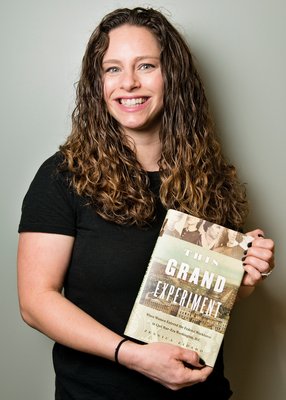
Jessica Ziparo has watched history repeat itself—first in the headlines, and then in the history books.
The narrative of the gender pay gap and sexual harassment in the workplace has dominated the news as of late, though it was when Ms. Ziparo was earning her doctorate at Johns Hopkins University in Baltimore that she realized it actually dates back to the 1860s.
“The present-ness of my research is sort of disturbing and depressing,” explained the Westhampton Beach native during a telephone interview from her home in Seattle. “It was like, ‘Wow, this is so timely,’ and then I thought, it is, but also, when would it not have been? When in the past 150 years would we have said, ‘Women are getting paid equally.’ It’s coming out a lot now, and we’re talking about it more, but sadly, it would have been timely at any point.”
Self-described as a “born feminist,” Ms. Ziparo was standing up for women’s rights before she really knew how—“My mom finally let me quit CCD [Confraternity of Christian Doctrine] in second grade because she was so tired of me fighting with the nuns about why women couldn’t be priests,” she said—and recently realized her calling with the publication of her first book, “The Grand Experiment: When Women Entered the Federal Workforce in Civil War-Era Washington, D.C.,” earning her recognition from 35 Debut Authors Over 35.
“The Civil War era was such a moment of possibility, with the end of enslavement, the Reconstruction Amendments, and the women’s suffrage movement splitting from the abolitionist movement,” Ms. Ziparo said. “I thought, why didn’t women achieve more in this moment of possibility? So, I started looking at women in that time period and I stumbled across it.”
Leafing through archives, Ms. Ziparo serendipitously discovered it wasn’t for lack of trying. She found petitions filed by women in the 1860s demanding equal pay, which ultimately sparked her research that traces the struggles and triumphs of early female federal employees in Washington, D.C., how they challenged societal gender norms, and carved out a place for themselves in the capital.
“There’s a quote in the introduction of the book from a woman who worked for the Treasury Department in 1869, and she said, ‘We don’t want to be petted. We want simply justice. We ask no advantage, we ask for equal rights. Can we ever have them? We are not play things, we are not dolls, we are human beings,’” Ms. Ziparo read. “We’ve had to repeatedly assert that.
“It’s great that people are listening now, and I really hope this is the watershed moment that should have occurred in the past,” she continued. “But I just think, gosh, I don’t want to go back in time and tell her it’s taken this long and we’re still not there yet.”
Holding the book in her hands feels surreal, Ms. Ziparo said. There is pride and joy, but also a sense of aggravation that this book needed to be written.
That this is a topic still up for discussion.
“It can be very frustrating. Gosh, how long have we been saying this? I’m definitely excited, but I’m sad that women for so long have had to deal with this, and are still dealing with this,” she said. “That I still have to follow equal pay organizations on Twitter, that the Women’s March in 2017 had to put, ‘We believe in equal pay for men and women’ as part of their principles. And it’s like, yeah! This seems like such a basic concept, and it’s so frustrating that we’re still talking about it.”
For more information about “The Grand Experiment: When Women Entered the Federal Workforce in Civil War-Era Washington, D.C.” by Jessica Ziparo, visit 35over35.com.